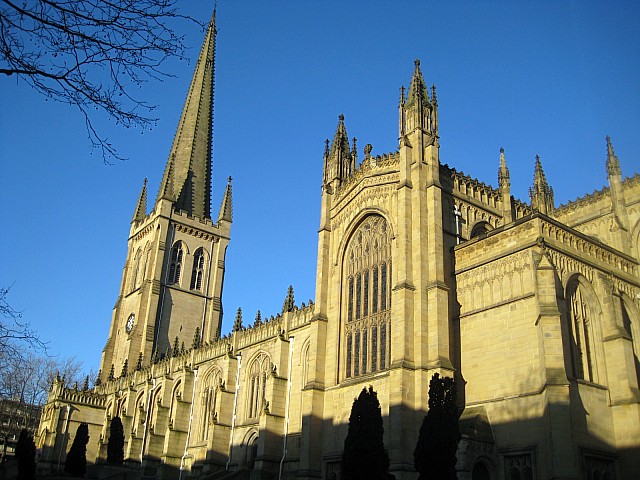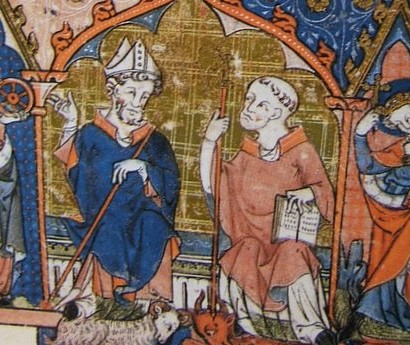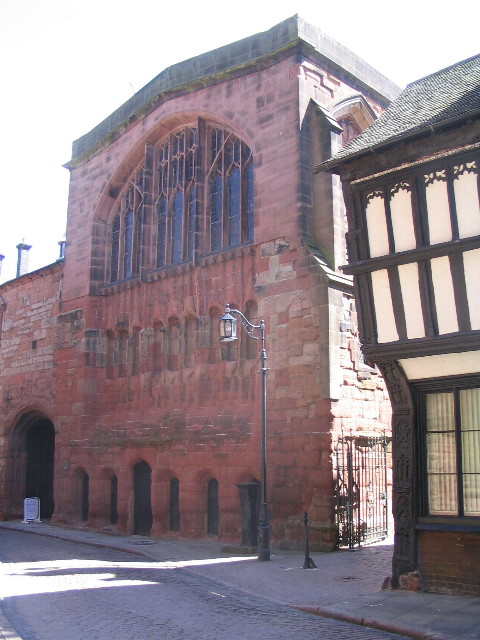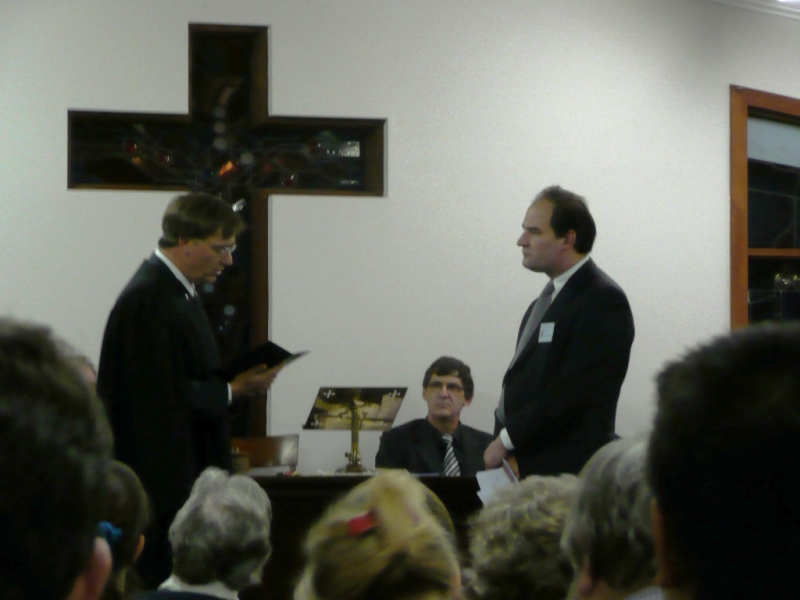|
John Lister (priest)
John Field Lister (19 January 1916 – 23 August 2006) was an Anglican priest. Early life and education Lister was born on 19 January 1916. He was educated at King's School, Worcester, a private school in Worcester, Worcestershire. He studied theology at Keble College, Oxford, graduating with a Bachelor of Arts (BA) degree in 1938; and proceeded MA in 1942. In 1938, he entered Cuddesdon College, an Anglican theological college, to under a years training for ordained ministry. Ordained ministry Lister was ordained in the Church of England as a deacon in 1939 and as a priest in 1941. He was initially a Curate at St Nicholas Radford. After this he was Curate at St John the Baptist, Coventry and then Vicar of Brighouse. He was Archdeacon of Halifax from 1961 to 1972, when he became Provost of Wakefield – a post he held for a decade. He retired from full-time ministry in 1982. Later life In retirement, from 1982 to 2003, Lister held Permission to Officiate in the Diocese o ... [...More Info...] [...Related Items...] OR: [Wikipedia] [Google] [Baidu] |
Provost Of Wakefield
The Dean of Wakefield is the head (''primus inter pares'' – first among equals) and chair of the chapter of canons, the ruling body of Wakefield Cathedral. The dean and chapter are based at the ''Cathedral Church of All Saints Wakefield''. Before 2000 the post was designated as a provost, which was then the equivalent of a dean at most English cathedrals. The cathedral is one of three co-equal mother churches of the Diocese of Leeds and a seat of the Bishop of Leeds. The current dean is Simon Cowling.Wakefield Cathedral — New Dean for Wakefield Cathedral (Accessed 29 May 2018) List of provosts and deans Provosts *1931–1932[...More Info...] [...Related Items...] OR: [Wikipedia] [Google] [Baidu] |
Worcester, England
Worcester ( ) is a cathedral city in Worcestershire, England, of which it is the county town. It is south-west of Birmingham, north-west of London, north of Gloucester and north-east of Hereford. The population was 103,872 in the 2021 Census. The River Severn flanks the western side of the city centre. It is overlooked by Worcester Cathedral. Worcester is the home of Royal Worcester, Royal Worcester Porcelain, composer Edward Elgar, Lea & Perrins, makers of traditional Worcestershire sauce, the University of Worcester, and ''Berrow's Worcester Journal'', claimed as the world's oldest newspaper. The Battle of Worcester in 1651 was the final battle of the English Civil War, during which Oliver Cromwell's New Model Army defeated Charles II of England, King Charles II's Cavalier, Royalists. History Early history The trade route past Worcester, later part of the Roman roads in Britain, Roman Ryknild Street, dates from Neolithic times. It commanded a ford crossing over the Rive ... [...More Info...] [...Related Items...] OR: [Wikipedia] [Google] [Baidu] |
Vicar
A vicar (; Latin: ''vicarius'') is a representative, deputy or substitute; anyone acting "in the person of" or agent for a superior (compare "vicarious" in the sense of "at second hand"). Linguistically, ''vicar'' is cognate with the English prefix "vice", similarly meaning "deputy". The title appears in a number of Christian ecclesiastical contexts, but also as an administrative title, or title modifier, in the Roman Empire. In addition, in the Holy Roman Empire a local representative of the emperor, perhaps an archduke, might be styled "vicar". Roman Catholic Church The Pope uses the title ''Vicarius Christi'', meaning the ''vicar of Christ''. In Catholic canon law, ''a vicar is the representative of any ecclesiastic'' entity. The Romans had used the term to describe officials subordinate to the praetorian prefects. In the early Christian churches, bishops likewise had their vicars, such as the archdeacons and archpriests, and also the rural priest, the curate who had the ... [...More Info...] [...Related Items...] OR: [Wikipedia] [Google] [Baidu] |
Coventry
Coventry ( or ) is a City status in the United Kingdom, city in the West Midlands (county), West Midlands, England. It is on the River Sherbourne. Coventry has been a large settlement for centuries, although it was not founded and given its city status until the Middle Ages. The city is governed by Coventry City Council. Historic counties of England, Formerly part of Warwickshire until 1451, Coventry had a population of 345,328 at the 2021 census, making it the tenth largest city in England and the 12th largest in the United Kingdom. It is the second largest city in the West Midlands (region), West Midlands region, after Birmingham, from which it is separated by an area of Green belt (United Kingdom), green belt known as the Meriden Gap, and the third largest in the wider Midlands after Birmingham and Leicester. The city is part of a larger conurbation known as the Coventry and Bedworth Urban Area, which in 2021 had a population of 389,603. Coventry is east-south-east of ... [...More Info...] [...Related Items...] OR: [Wikipedia] [Google] [Baidu] |
Radford, Coventry
Radford is a suburb and electoral ward of Coventry, located approximately 1.5 miles north of Coventry city centre. It is covered by the Coventry North West constituency. Geography Radford ward is bounded by Holbrooks, Foleshill, St Michael's, Sherbourne, and Bablake wards. It is covered by the North East Neighbourhood Management area. It covers an area of 303.9 hectares. Radford consists of four neighbourhoods; Radford Diamond, East Radford, West Radford, and Canal Basin. Radford Diamond is located approximately one mile to the northwest of Coventry city centre and is bounded by Barkers Butts Lane, Lawrence Saunders Road and the Radford Road with the Coventry-Nuneaton railway forming the southern boundary. East Radford is a small neighbourhood consisting of six streets of densely populated housing: Newfield Road, Dorset Road, Somerset Road, Widdrington Road, Kingfield Road and Aldbourne Road. The Coventry-Nuneaton railway bounds the area on one side whilst the Coventry Canal bou ... [...More Info...] [...Related Items...] OR: [Wikipedia] [Google] [Baidu] |
Curate
A curate () is a person who is invested with the ''care'' or ''cure'' (''cura'') ''of souls'' of a parish. In this sense, "curate" means a parish priest; but in English-speaking countries the term ''curate'' is commonly used to describe clergy who are assistants to the parish priest. The duties or office of a curate are called a curacy. Etymology and other terms The term is derived from the Latin ''curatus'' (compare Curator). In other languages, derivations from ''curatus'' may be used differently. In French, the ''curé'' is the chief priest (assisted by a ''vicaire'') of a parish, as is the Italian ''curato'', the Spanish ''cura'', and the Filipino term ''kura paróko'' (which almost always refers to the parish priest), which is derived from Spanish. Catholic Church In the Catholic Church, the English word "curate" is used for a priest assigned to a parish in a position subordinate to that of the parish priest. The parish priest (or often, in the United States, the "pastor ... [...More Info...] [...Related Items...] OR: [Wikipedia] [Google] [Baidu] |
Priest
A priest is a religious leader authorized to perform the sacred rituals of a religion, especially as a mediatory agent between humans and one or more deities. They also have the authority or power to administer religious rites; in particular, rites of sacrifice to, and propitiation of, a deity or deities. Their office or position is the 'priesthood', a term which also may apply to such persons collectively. A priest may have the duty to hear confessions periodically, give marriage counseling, provide prenuptial counseling, give spiritual direction, teach catechism, or visit those confined indoors, such as the sick in hospitals and nursing homes. Description According to the trifunctional hypothesis of prehistoric Proto-Indo-European society, priests have existed since the earliest of times and in the simplest societies, most likely as a result of agricultural surplus and consequent social stratification. The necessity to read sacred texts and keep temple or church rec ... [...More Info...] [...Related Items...] OR: [Wikipedia] [Google] [Baidu] |
Deacon
A deacon is a member of the diaconate, an office in Christian churches that is generally associated with service of some kind, but which varies among theological and denominational traditions. Major Christian churches, such as the Catholic Church, the Oriental Orthodox Churches, the Eastern Orthodox Church, the Scandinavian Lutheran Churches, the Methodist Churches, the Anglican Communion, and the Free Church of England, view the diaconate as an order of ministry. Origin and development The word ''deacon'' is derived from the Greek word (), which is a standard ancient Greek word meaning "servant", "waiting-man", "minister", or "messenger". It is generally assumed that the office of deacon originated in the selection of seven men by the apostles, among them Stephen, to assist with the charitable work of the early church as recorded in Acts of the Apostles chapter 6. The title ''deaconess'' ( grc, διακόνισσα, diakónissa, label=none) is not found in the Bible. Ho ... [...More Info...] [...Related Items...] OR: [Wikipedia] [Google] [Baidu] |
Ordained
Ordination is the process by which individuals are consecrated, that is, set apart and elevated from the laity class to the clergy, who are thus then authorized (usually by the denominational hierarchy composed of other clergy) to perform various religious rites and ceremonies. The process and ceremonies of ordination vary by religion and denomination. One who is in preparation for, or who is undergoing the process of ordination is sometimes called an ordinand. The liturgy used at an ordination is sometimes referred to as an ordination. Christianity Roman Catholic, Orthodox, Lutheran and Anglican churches In Roman Catholicism and Orthodoxy, ordination is one of the seven sacraments, variously called holy orders or '' cheirotonia'' ("Laying on of Hands"). Apostolic succession is considered an essential and necessary concept for ordination in the Catholic, Orthodox, High Church Lutheran, Moravian, and Anglican traditions, with the belief that all ordained clergy are ... [...More Info...] [...Related Items...] OR: [Wikipedia] [Google] [Baidu] |
Ordained Ministry
Ordination is the process by which individuals are consecrated, that is, set apart and elevated from the laity class to the clergy, who are thus then authorized (usually by the denominational hierarchy composed of other clergy) to perform various religious rites and ceremonies. The process and ceremonies of ordination vary by religion and denomination. One who is in preparation for, or who is undergoing the process of ordination is sometimes called an ordinand. The liturgy used at an ordination is sometimes referred to as an ordination. Christianity Roman Catholic, Orthodox, Lutheran and Anglican churches In Roman Catholicism and Orthodoxy, ordination is one of the seven sacraments, variously called holy orders or '' cheirotonia'' ("Laying on of Hands"). Apostolic succession is considered an essential and necessary concept for ordination in the Catholic, Orthodox, High Church Lutheran, Moravian, and Anglican traditions, with the belief that all ordained clergy are ordain ... [...More Info...] [...Related Items...] OR: [Wikipedia] [Google] [Baidu] |
Theological College
A seminary, school of theology, theological seminary, or divinity school is an educational institution for educating students (sometimes called ''seminarians'') in scripture, theology, generally to prepare them for ordination to serve as clergy, in academics, or mostly in Christian ministry. The English word is taken from the Latin ''seminarium'', translated as ''seed-bed'', an image taken from the Council of Trent document ''Cum adolescentium aetas'' which called for the first modern seminaries. In the United States, the term is currently used for graduate-level theological institutions, but historically it was used for high schools. History The establishment of seminaries in modern times resulted from Roman Catholic reforms of the Counter-Reformation after the Council of Trent. These Tridentine seminaries placed great emphasis on spiritual formation and personal discipline as well as the study, first of philosophy as a base, and, then, as the final crown, theology. The oldest C ... [...More Info...] [...Related Items...] OR: [Wikipedia] [Google] [Baidu] |








